Understanding Pope Francis: It’s the Moral Theology, Stupid
COMMENTARY: Something serious does seem to be afoot with this papacy that differs markedly from its predecessors, and that ‘something’ is a revolutionary change in moral theology.

In 1992, with America in the midst of a recession, then-candidate for president Bill Clinton had a simple message: “It’s the economy, stupid.” Paraphrasing a bit, I would say something similar with regard to the enigma that is Pope Francis: “It’s the moral theology, stupid.”
And I say that he is an enigma because the common narrative with regard to him seems to be that he is a “liberal,” and yet he has not given the liberal wing of the Church any of their most cherished goals. He has not ended mandatory celibacy, ordained women to the priesthood or the diaconate, changed the Church’s teachings on human sexuality, opened Eucharistic reception to Protestants as a matter of official canon law, or even granted carte blanche permission for the divorced-and-civilly remarried to receive Communion. And yet, something serious does seem to be afoot with this papacy that differs markedly from his predecessors, and that “something” I think is a revolutionary change in moral theology.
It is my claim that Pope Francis seems favorably disposed to a form of moral theology that has been commonly referred to as “proportionalism” or “consequentialism.” At the very least, I think Pope Francis sees in proportionalism a kind of “corrective” counterweight to what he considers to be an overemphasis in the Church on natural-law moral reasoning with its central focus on certain moral objects as intrinsically evil.
Proportionalism denies that there are intrinsically evil acts and that the morality of an act can only be judged in the light of its outcomes or “consequences.” Catholic proportionalists do not deny that there are indeed foundational moral principles (which is how it differs from a straight-up and unvarnished utilitarianism), but that in the light of a rational adjudication of potential likely outcomes, a moral principle can be denied as applicable in a particular instance if there is a “proportionate” reason for doing so.
This form of moral theology was very influential in the post-conciliar era and gained further strength among those who vociferously dissented from Humanae Vitae. Those of us who lived through those debates know well how divisive they were, and certain moral theologians who defended the Church’s traditional natural-law theology (e.g., Germain Grisez, Janet Smith, et. al.) paid a heavy professional price for their stance.
So what is my evidence that Pope Francis favors proportionalism even though he has never explicitly said so?
For starters, in 2017, he stated that the proportionalist moral theologian Bernard Häring was a paradigmatic model for how moral theology should be renewed in the light of Vatican II. This is the same Bernard Häring who dissented from Humanae Vitae and Veritatis Splendor on key moral issues that went well beyond the contraception question. Why would Pope Francis go out of his way to point to Häring as a model for moral theology, knowing full well that Häring had strongly dissented from the teachings of Paul VI and John Paul II?
In my opinion, the reason is quite clear: Namely, that Pope Francis, even if he disagreed with Häring’s dissent, favors the moral theological model that Häring represents. The only other option is to claim that Pope Francis was ignorant of what Häring really represented, which I find highly unlikely. Indeed, and not to put too fine a point on it, of all of the moral theologians Pope Francis could have held up as models — e.g., someone like Servais Pinckaers — he chose a proportionalist instead. I think that is significant. I think it means something.
Second, Pope Francis seems to embrace a form of moral reasoning, closely allied with proportionalism, that says that in the concrete circumstances of life, circumstances which are often complex, difficult and messy, a person’s ability to live the objective moral law might be so limited that he or she may indeed be inculpable for any moral guilt and may, in fact, be doing what God wills for them in his or her concrete existence, despite what the objective moral norm teaches. In other words, the moral principle in question is affirmed, but it may be set aside in certain complex cases that present us with a proportionate reason for doing so. This is different from “inculpable ignorance” of the principle in question since the principle is known and affirmed, but is just “set aside in this instance.”
And, in so adjudicating the circumstances as limiting and mitigating, we can then affirm with a secure conscience that we are in fact doing God’s will, despite the violation of the principle in question. For example, in Amoris Laetitia Chapter Eight, Pope Francis makes the following statement:
“Yet conscience can do more than recognize that a given situation does not correspond objectively to the overall demands of the Gospel. It can also recognize with sincerity and honesty what for now is the most generous response which can be given to God, and come to see with a certain moral security that it is what God himself is asking amid the concrete complexity of one’s limits, while yet not fully the objective ideal” (303).
This, it seems to me, is a clear endorsement of a more proportionalist understanding of moral theology. Pastoral mercy and a gradualist approach to bringing people to the fullness of the truth is all well and good, and Pope Francis rightly endorses such a law of gradualness. But to go further and say that circumstances might turn an objectively immoral act into God’s will for my life right now, and to be able to say so with a secure conscience, is quite another matter. This stands in stark contrast with the words of Pope St. John Paul in Familiaris Consortio (34):
They cannot however look on the law as merely an ideal to be achieved in the future: they must consider it as a command of Christ the Lord to overcome difficulties with constancy. “And so what is known as ‘the law of gradualness’ or step-by-step advance cannot be identified with ‘gradualness of the law,’ as if there were different degrees or forms of precept in God's law for different individuals and situations.”
Third, one must also consider the significance of the Pope’s demolition of the John Paul II Institute for Studies on Marriage and Family in Rome. Academic due process was violated in extreme ways as the professors at the institute were just summarily fired for clearly ideological reasons. These professors were all supporters of Veritatis Splendor and the Church’s tradition of natural-law moral reasoning. They were replaced with proportionalists, some of whom are on record stating that the Church’s teaching on contraception and homosexuality should be looked at again in the light of “contemporary insights and circumstances.” Furthermore, the institute’s new focus is no longer Veritatis Splendor, but Amoris Laetitia, with the latter interpreted as an “opening” to a “fresh look” at certain “questionable” teachings of the Church. Space precludes that I go into all of the details, and many before me have done so admirably anyway.
Finally, as I am fond of saying at every turn, personnel is policy. And when one looks at the high-level episcopal appointments Francis has made, especially in the United States and Europe, one sees a clear pattern emerging as to the kind of prelate Pope Francis prefers. They might differ widely in tone and temper, and they may not all share the same theological opinions on all matters. But they all have one thing in common, and that is an adherence to a form of pastoral accompaniment that clearly implies for those with eyes to see a form of proportionalist moral reasoning.
Along these lines, many conservative Catholics groaned in despair over the red hat that was awarded to Bishop Robert McElroy of San Diego. I do not know Bishop, now Cardinal-designate, McElroy personally, and I will pray for him (truly) since he is now one of the leading lights in the American episcopacy, and I wish him well. But what does catch my eye, and which should catch the eyes of all, is that this is just one more example, one more confirmation, of what it is I am talking about. And that is that the most significant thing about this current papacy is the revolution in moral theology it seems to be embracing.
Therefore, instead of wringing our hands in despair over this or that aspect of ecclesial politics, we need to attend to the theology. Because it is the moral theology, stupid.
- Keywords:
- pope francis
- moral theology
- john paul ii institute
- familiaris consortio
- veritatis splendor
- amoris laetitia

















